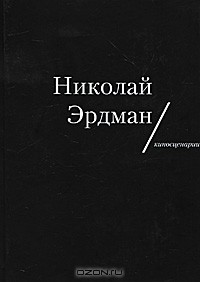In spite of his doomed theatrical career cut short by repression and censorship, Nikolai Erdman must surely be the greatest Soviet playwright. His two major plays - Самоубийца ( The Suicide) and Мандат (The Warrant) - were, in retrospect, genuine miracles. It is a cause for considerable mourning that Erdman's theatrical career was cut short by political repression and his subsequent marginlisation. Yet there is one area which greatly benefitted from Erdman's misfortune and that is that of film. Erdman was to become one of Soviet cinema's greatest scriptwriters and now finally Erast Garin's wish that Erdman's film scripts be collected and published is coming to fruition. The St Petersburg magazine and publishing house Seance are to be congratulated for this. Even though this volume doesn't include every single script, a small bu significant selection of them allows us to appreciate the genius of this great playwright.
The collection begins with Митя (Mitya)- a film script written at the same time as Erdman's play Самоубийца. While they are very different in many ways they are both attempts to create a new form of Soviet tragicomedy (with the film leaning closer to comedy and the play veering to tragedy). The fact that no copy of the film is extant is truly regrettable offering us another of those tantalising lost masterpieces that litter the history of Russian & Soviet cinema. Initially the director of the film was to be the great theatre director Vsevolod Meyerhold and Erdman was to play in the main role - so as well as tantalising us with the existence of a lost masterpiece one is tormented by trying to imagine how Meyerhold would have created yet another great film and how Erdman would have been captured for posterity. Later though it was Nikolai Okhlopkov - a Meyerhold renegade (or at least this is how Meyerhold saw him) who was to take both the role of both director and main actor.
After Митя, Erdman was one of the many great writers who were to work on Boris Barnet's Дом на Трубной (The House on Trubnaya Square). It is hard to say what exact part Erdman played in the making of the script for this masterpiece - it was a script worked on by some of the most talented writers of the early Soviet period including Viktor Shklovsky, Vadim Shershenevich and Anatolii Mariengof. However, it seems that Erdman was the first to work on the script along with the author of the original script Bela Zorich. Mariengof and Erdman were to work on another script together, namely that of Проданный
аппетит (The Sale of an appetite) based on a pamphlet by Paul Laforgue.
After working with Pyriev on his Посторонняя
женщина ( A Strange Woman) - another satirical tour-de-force which would have been unthinkable in the later Stalin years, Erdman a few years later set to work on Весёлые ребя́та (Jolly fellows). This first exercise in musical comedy has earned a significant place in Soviet comedy both in terms of popular taste and in terms of being a landmark film in Soviet film history. While it was harshly criticised by the then film critics, it was saved from their wrath by Stalin and Shumiatsky. The film veers between the anarchic and the carnivalistic, However, while the film met with phenomenal success, Erdman and his co-writer Vladimir Mass were arrested and sent into exile- though whether this was due to their politically sharp fables or Erdman's play The Suicide seems uncertain. Their names, however, were withdrawn from the titles of the film and it has only been relatively recently that the story of their collaboration in the film has fully been told.
Boris Barnet - a director who was not for the first and only time to work with previously marginalised figures would again work with Erdman on his ill-starred Старый Наездник (The Old Jockey). Barnet was, as was his wont, to deliver a film that had only an indirect link to the script, although he stated that the script was one of the most enjoyable that he had ever read. However he quipped that he found it easier to work with bad scripts rather than with good ones since it was the interplay of visual and literary gags which was his real forte.
After the war Erdman worked on a number of scripts for the director Konstantin Iudin including one of his most celebrated films Смелые Люди (Audacious People) and also wrote some scripts for some truly great animated films including Лягушка-Путешественника (The Travelling Frog). One of the very best satirical films ever made in Soviet times Каин XVIII was also an Erdman script based on an original unfinished variant by that other truly great playwright Evgeny Shvarts who died before he had the chance to finish it. Erdman is said to have completely rewritten the script and much of the praise must go to him. (Erdman and Shvarts in many ways represented two very differing wings of Soviet satire). The film didn't get a very good reception at the time but looking back after decades the satire of its script seems so sharp and brilliant that it shines through any inadequacies of the film due to inadequate directorial decisions.
The fact that finally a good selection of Erdman's scripts are publicly available gives us an insight into the notable role that Nikolai Erdman played in Soviet cinema. A role occasioned by the negative facts of political repression and exclusion from the established theatre which is certainly a great tragedy but nonetheless what was theatre's loss seems to have become cinema's gain.





No comments:
Post a Comment